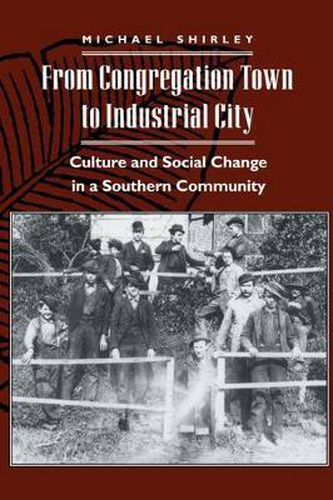Readings Newsletter
Become a Readings Member to make your shopping experience even easier.
Sign in or sign up for free!
You’re not far away from qualifying for FREE standard shipping within Australia
You’ve qualified for FREE standard shipping within Australia
The cart is loading…






In 1835, Winston and Salem was a well-ordered, bucolic, and attractive North Carolina town. A visitor could walk up Main Street from the village square and get a sense of the quiet Moravian community that had settled here. Yet, over the next half-century, this idyllic village was to experience dramatic changes. The Industrial Revolution calls forth images of great factories, mills, and machinery; yet, the character of the Industrial Revolution went beyond mere changes in modes of production. It meant the radical transformation of economic, social, and political institutions, and the emergence of a new mindset that brought about new ways of thinking and acting. Here is the illuminating story of Winston-Salem, a community of artisans and small farmers united, as members of a religious congregation, by a single vision of life. Transformed in just a few decades from an agricultural region into the home of the smokestacks and office towers of the R.J. Reynolds Tobacco Company and the Wachovia Bank and Trust Company, the Moravian community at Salem offers an illuminating illustration of the changes that swept Southern society in the nineteenth century and the concomitant development in these communities of a new ethos. Providing a rich wealth of information about the Winston-Salem community specifically, From Congregation Town to Industrial City also significantly broadens our understanding of how wholesale changes in the nineteenth century South redefined the meaning and experience of community. For, by the end of the century, community had gained an entirely new meaning, namely as a forum in which competing individuals pursued private opportunities and interests.
$9.00 standard shipping within Australia
FREE standard shipping within Australia for orders over $100.00
Express & International shipping calculated at checkout
In 1835, Winston and Salem was a well-ordered, bucolic, and attractive North Carolina town. A visitor could walk up Main Street from the village square and get a sense of the quiet Moravian community that had settled here. Yet, over the next half-century, this idyllic village was to experience dramatic changes. The Industrial Revolution calls forth images of great factories, mills, and machinery; yet, the character of the Industrial Revolution went beyond mere changes in modes of production. It meant the radical transformation of economic, social, and political institutions, and the emergence of a new mindset that brought about new ways of thinking and acting. Here is the illuminating story of Winston-Salem, a community of artisans and small farmers united, as members of a religious congregation, by a single vision of life. Transformed in just a few decades from an agricultural region into the home of the smokestacks and office towers of the R.J. Reynolds Tobacco Company and the Wachovia Bank and Trust Company, the Moravian community at Salem offers an illuminating illustration of the changes that swept Southern society in the nineteenth century and the concomitant development in these communities of a new ethos. Providing a rich wealth of information about the Winston-Salem community specifically, From Congregation Town to Industrial City also significantly broadens our understanding of how wholesale changes in the nineteenth century South redefined the meaning and experience of community. For, by the end of the century, community had gained an entirely new meaning, namely as a forum in which competing individuals pursued private opportunities and interests.